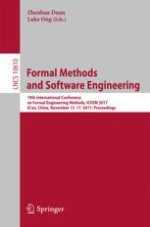2017 | OriginalPaper | Buchkapitel
Improving Probability Estimation Through Active Probabilistic Model Learning
verfasst von : Jingyi Wang, Xiaohong Chen, Jun Sun, Shengchao Qin
Erschienen in: Formal Methods and Software Engineering
Aktivieren Sie unsere intelligente Suche, um passende Fachinhalte oder Patente zu finden.
Wählen Sie Textabschnitte aus um mit Künstlicher Intelligenz passenden Patente zu finden. powered by
Markieren Sie Textabschnitte, um KI-gestützt weitere passende Inhalte zu finden. powered by
